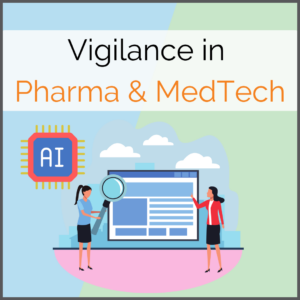
In the European Union, medicinal products and medical devices are only approved for the market if manufacturers can guarantee the safety of their products. If adverse events occur after the products have been placed on the market, the vigilance procedures of the respective industries take effect. This is because patient safety continues to be a very important concern in the healthcare sector.
With the introduction of the Medical Device Regulation (MDR) and the pharmacovigilance system of the European Medicines Agency (EMA), the EU has established a framework to improve patient safety and strengthen surveillance mechanisms. This article aims to contrast the concepts of pharmacovigilance and post-market surveillance/vigilance of medical devices. In addition, the potential of artificial intelligence (AI) to support these topics is considered.
Pharmacovigilance
The task of pharmacovigilance is to monitor the product safety in the pharma industry. Before its approval, clinical studies are carried out in which any adverse event is detected and documented. Unfortunately, undesirable side effects can still occur after a drug has been launched on the market. Possible reasons can be multi-medication, off-label use, or medication errors. Here post-marketing pharmacovigilance becomes relevant. Regulation (EC) No. 726/2004 (Article 48) stipulates that every market authorization holder of a drug must have a Qualified Person for Pharmacovigilance (QPPV). This person is responsible, according to this regulation and the Good Vigilance Practice guidelines (GVP), for the implementation and management of a pharmacovigilance and risk management system. Other tasks include documentation and reporting requirements, as well as the preparation of reports for the respective authorities.
Post-Market Surveillance and Vigilance for Medical Devices
Post-market surveillance is the continuous monitoring and evaluation of the safety and performance of approved medical devices. This is done by proactively and reactively collecting data on the product in question. Vigilance is the handling of serious incidents and their timely reporting. Additionally, organizes the handling of safety corrective actions in the practical use of medical devices. According to the EU MDR, Chapter VIII, manufacturers are obliged to set up a system for monitoring potential risks. This can include malfunctions, performance deficiencies, or adverse events. In addition, the MDR requires the maintenance of updated post-market surveillance plans. It includes the designation of a responsible person for vigilance tasks.
AI as a possibility
A common feature of MedTech and Pharma industries is the collection and analysis of data in the context of pharmacovigilance and vigilance/post-market surveillance. Artificial intelligence (AI) can analyze these vast amounts of data from various sources. Whether these are from electronic health records or clinical trials. Additionally, AI can search for correlations between certain drugs and adverse events (side effects or interactions) within a database. It can also identify patients at higher risk for adverse events based on their medical history and/or other factors. AI furthermore helps to streamline adverse event reporting and monitoring.
To sum up, Artificial Intelligence could have the potential to greatly simplify product safety in the Pharma and MedTech sectors and increase patient safety.
Outsourcing of sub-processes
Vigilance and post-market surveillance activities, whether in Pharma or MedTech, are complex and experts on the marketing authorization holder’s side should therefore always have primary responsibility for these processes. Be it due to the increase of risks in Pharma or changing regulations in MedTech. The requirements are constantly increasing and present small and medium-sized companies in particular with the challenge of freeing up more personnel resources. companies, the persons responsible for vigilance work at double capacity. The designated employees often receive these tasks in addition to their primary duties.
Outsourcing certain tasks can be advantageous here. A large part of the duties (diligence) can be handed over to a third party. Possible processes could be the collection of data on potential side effects, the development of risk management plans, or the preparation of reports. A significant benefit of outsourcing is the saving of costs for personnel, administration, and training. In addition, outsourcing improves access to topic-relevant expertise and technical resources of the provider company, such as artificial intelligence.